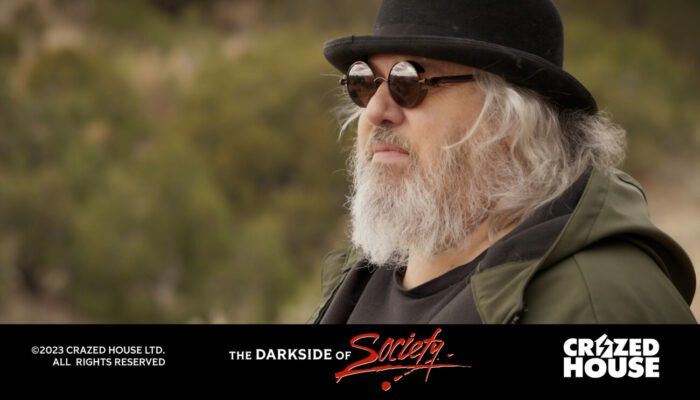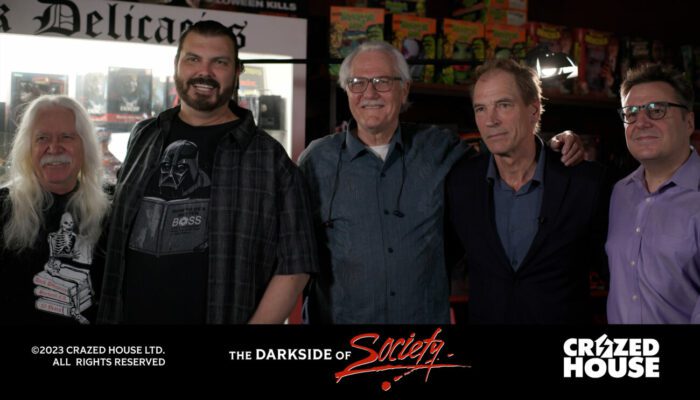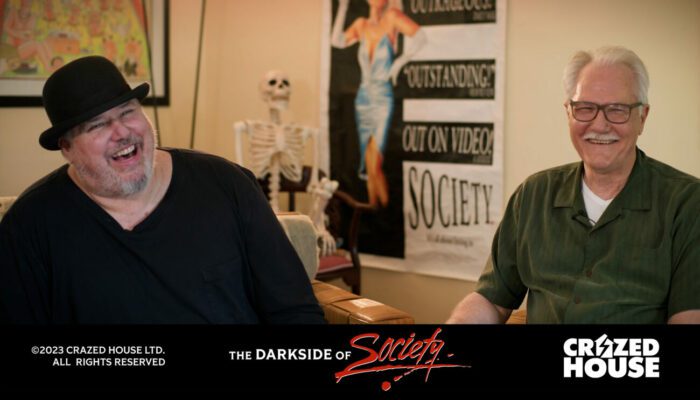In 1989, Society, a film of unfathomable imagination, leapt forth from the screen and burned itself into the retinas of horror fans everywhere. In the film, a teenage boy is paranoid that he’s being groomed for some insidious plot through his network of high society family and friends. Society preyed on Satanic Panic era fears for audiences, but where the film’s shunting sequence was a jaw-dropping spectacle of high society succumbing to their lowbrow intentions, for the film’s writer Woody Keith, filming the movie became an awakening.
The Darkside of Society looks back at 1989’s Society, but unlike the copious milieu of nostalgic documentaries that litter our horror streaming services lately, it does not fondly remember the experience of its writer, Woody Keith. Keith now goes by a new name, Zeph E. Daniel, attempting to garner some distance between his namesake and the trauma he insists they caused him.

Directing the documentary is Larry Wade Carrell, who also happens to be Zeph’s producing partner at Crazed House. Together, they’ve released two films, the multi-award-winning film fest dazzler Girl Next and the newly released The Quantum Devil, two parts in a four-part series they call “The Quantum Quartet.” The Darkside of Society is born from the account that Zeph told Carrell about his experience working on Society and discovering he subconsciously based the story on repressed childhood memories.
The Darkside of Society takes a sharp turn into terror for Zeph as his suspicions about his Hollywood elite parents lead him to believe he was institutionalized repeatedly to remain silent.
I sat down with Zeph and Larry just before the premiere of their documentary at Fright Fest, but unfortunately, due to some technical and potentially legal reasons, most of what was discussed was deemed unusable. I was joined again later by Larry Wade Carrell to discuss The Darkside of Society.
Below is the video of the full interview with Larry Wade Carrell, which includes a snippet of our first discussion with Zeph E. Daniel. Where this is Zeph’s story, and because I’m thankful that he took the time to speak with me, I wanted to include something to give the viewer some context of the sweet man that Zeph genuinely is as he overcomes whatever trauma he has incurred. As he says, “Believe what you want.”
You can watch the full interview with Larry Wade Carrell or read excerpts from the conversation below.
Sean Parker: You’ve worked with Zeph in the last couple of films. What was it about Zeph’s story that made you decide that this was a good time to tell it?
Larry Wade Carrell: “Initially, I probably wasn’t on board to tell it. You know? We did Girl Next together, and then we formed Crazed House, and we just kept working together, but naturally, I was really excited when I got to work with him because, you know? Society, Bride of Reanimator, and all that. Of course, I asked him about it. And then when he started telling me his story, it’s kind of like jaw-dropping, and, at first, it was a lot to take in. And it was actually our producer Morris who came up with the concept. He’s like, “Hey, we should just do a documentary about that.” I said, “Oh, OK.” And then we were like, oh, we should direct it, I was like, “Oh, no.”
But I thought about it, and then, what’s kind of weird is it’s probably…and I feel like it probably is the same for the audiences; when I first got into it, I thought, ‘OK, cool,’ we’ll do a behind the scenes of Society and how we got the script and all that. And the more we got into it, the more with Zeph’s story and stuff, and as a filmmaker, I had to follow that narrative. You know? And it does tell the story of how we got the script for Society, but it really goes into just Zeph telling his truth. You know? his story of surviving his abuse.”

SP: Zeph’s background puts him in sort of a weird place. He says that he’s been in institutions, and he says that he’s come out of those institutions. Now, he seems like he’s doing great, which is fantastic. Do you think that your audience is going to connect with this story based on the sort of stuff that Zeph has gone through and where Zeph has been?
LWC: Well, I mean, one thing I will say about Zeph because I’ve heard this story more than you can imagine, and it’s never changed. It’s never been wishy-washy. Yeah, it’s always been the same every time he tells it. So, what I think the audience is going to get out of it…Well, I mean, my hope is at the end of it. That the audience will take something from Zeph’s story and realize he overcame all that abuse and was able to turn it into positive things. And, you know, I had one reviewer That really made me feel good. She said she found it “heartbreaking, horrible, and inspirational.”
SP: Now you guys got that Quantum Devil…coming up. What’s [Zeph’s] writing style like now, post-Society?
LWC: I did most of the writing on Quantum Devil, and he came and did a pass, and we always just kind of go back and forth on things like that. But in regards to stuff writing, I think his pencil is sharper than ever. And some of that dialogue that just cuts, like, all the way back to Society. When he wrote Girl Next then, I was reading the first draft before we started working together. The character Heinrich had some just great dialogue, and I always remember I was just pissed. I was like, “I wish I was a good enough actor to play this role,” but I knew better.
But Steven Johnston was involved in The Quantum Devil way before it was The Quantum Devil. Quantum Devil was adapted from a script that he had written back then. But Stephen Johnston got a copy of Girl Next, and he read it, and his first words were, “I can definitely tell the writer of Society wrote this script.” You know? Every time Zeph writes stuff, and he’s been writing, we’re about to go into pre-production on Never Ever After, and then we’ve got Dragon Island coming up, and his pen is really sharp, man. The dialogue is really good, and you can definitely tell. And I think that’s one of the things we cover in the documentary that was trying to explain is that. Because of who Zeph is and because of, his past, and his upbringing, and his disdain for the rich, it gives him this unique voice. And it comes out in everything he writes. You know, I mean, when I read, I can just spot it instantly.

SP: A lot of Zeph’s story, a lot of The Darkside of Society, takes place in sort of an underground Hollywood. Have you ever encountered anything like that with weird Hollywood cabals or anything going on there?
LWC: Well, whenever I first started working with Zeph—you know, I’m a dude from Alvin, TX, from a small town, and I didn’t grow up—but Zeph grew up out there. His family lived in Beverly Hills. You know, his grandpa was one of the guys that helped get the street signs up in the neighborhood. And he’s told me stories from his childhood of being kicked out of Jack Palance[’s]. He went to spend the night with his buddy; it was Jack Palance’s kid, and they were playing the drums late in the night. And Jack Palance kicks the door open, [accosts] Zeph for playing the drums, and sends him home. Imagine that’s just like such a weird thing. But he grew up out there, and that’s why he has that. He just really hates it. He really hates the high society.
SP: But you’ve never encountered anything high-society-wise like that, maybe even just in filmmaking?
LWC: Well, no. When I started doing the research for this film, I started uncovering all kinds of things. And there’s so many stories out there, and they really—if you just start researching child actors—the things they’ve been saying for years that a lot of it got covered up for a long time. But you’ll find a lot of similar stories, just like Zeph. I mean, Paris Hilton recently came forward, and I think she had a documentary. So there’s definitely a lot of weird s**t that’s going on out there.
One thing I will say [is that] it’s kind of a difficult thing. We worked really hard did a lot of research, and it was really hard to make this documentary. And we went back and forth just getting it to where we had a story that we felt like we wanted to put out into the world. But then we had to get it past the lawyers. Though there was this whole process that, like, once the movie was done, it took almost a year of going back and forth and say, “Hey, no, you can’t say that about this person.” “You gotta cut this.” You got to do this.” There’s some edits in the movie that were sins to me as a filmmaker, but there just was no other choice. You know, you had to take out what they said you had to take out. So, I know that some of the reviews have come off and say, “Well, you told this side of the story, and this side of the story was not represented,” and, well, it’s not that. It’s that I was told not to even talk about what we took out.

SP: Yeah, that’s kind of difficult.
LWC: So yeah, if there’s a watchable movie there, I’m proud of it. I wish we could have put out what we had intended to put out, but I mean, that’s just the way that things are. I mean, nobody wants to be sued over anything and stuff. But the one thing I’m really happy about is that this has really kind of been like a healing kind of thing. Like, even since I first met Zeph and over the last years that we went through this, he’s been forced to kind of deal with things that he used to kind of just…You know, we’re always just kind of there, and he never unpacked them and resolved them. And there’s been a lot of things he’s resolved through this journey, and he’s doing really well now. I mean, he’s doing really good. His health’s returning. He’s lost a lot of weight since we did the documentary. Now I’m the fat guy of the two of us. But he’s doing well. I’m glad.
SP: Oh, that’s great. That’s fantastic. For Zeph, you said that this has been very healing. What is his demeanor now? Is he a little more easier going, or does that still rile him up? [Does] stuff like this still rile him up?
LWC: Oh, he gets riled up a lot. I mean, just by listening to the news, he can go off into a rage. But one of the things I’ll tell you about Zeph that has always made him endearing, to me at least. In the documentary, you’ll notice he’s telling you these horrible things, and he’ll stop, and he’ll just laugh because I don’t think he knows what else to do with it. It’s like, oh my God, we’re talking about some of the worst things you can imagine, and he’s just very resilient. I mean, I can’t imagine being in and out of institutions and have your own parents do these things to you. It was hard for me to grasp and understand that story, so I can imagine how it is for an audience. I mean, I did the best I could with it, and I wish that we could have left everything in. You know, it is what it is. No filmmaker can ever go around to every audience before the screening and say, “Well, hey, I made a really good movie, but I had these lawyers, and that’s screwed up, and then on this day, this was messed up, and you know, but enjoy!” It just has to stand on its own. It has to stand on its own. I think it’s going to divide people, obviously. And I think some people will like it, some people will hate it, but that’s just like any of my movies. As long as they’re being moved, I think I won.
[…]
I generally care about Zeph, and I love him, and he’s like family now. I’m proud of what we did, and I’m proud that it’s making him feel better. Already, we’ve had some people just even off the one screening come write me, and one person told me it was heartbreaking, they also found it inspirational, and they felt moved to come forward and tell their story, you know? For the abuse victims out there, that’s a lot.
__________________________________________
The Darkside of Society is currently touring the film festival circuit. Keep tabs on Zeph E. Daniel and Larry Wade Carrell by visiting their production company website, Crazed House. Larry and Zeph’s The Quantum Devil and Girl Next are now available on VOD.



